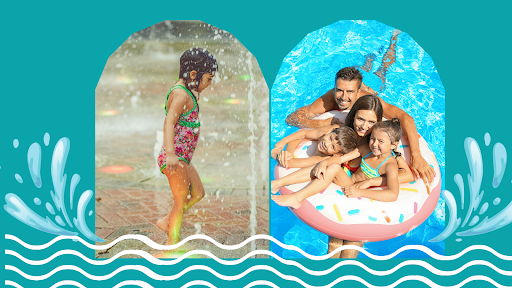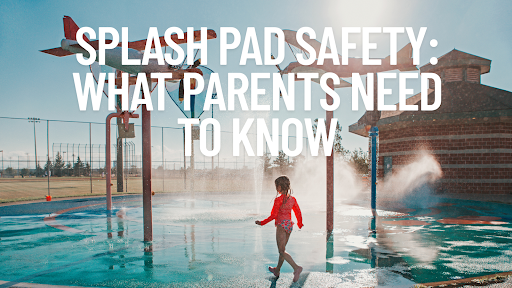The Benefits Of Water Play In Early Childhood Development
Discover how water play boosts motor skills, creativity, and early development while making learning fun for young children.


Water play isn't just about making a splash; it's a significant part of early childhood development. This interactive form of play fosters a wide range of crucial skills for young children.
From hand-eye coordination to problem-solving skills, let's dive into how water play can enhance a child's abilities.
What is Water Play?
Water play involves activities where children interact with water. This can be as simple as pouring water from one container into another or as complex as a multi-feature splash pad. In essence, water play is a form of children's play that can take place indoors or outdoors, encouraging exploration, experimentation, and joy.
5 Benefits Of Water Play

Water play is crucial in early childhood development, enhancing hand-eye coordination and introducing basic maths and scientific concepts. It boosts concentration, aids in motor skill development, and fosters essential social and communication skills. These benefits make water play an invaluable activity for young children.
- Water Play Develops Hand-Eye Coordination
- Water Play Introduces Maths and Scientific Concepts
- Water Play Enhances Concentration and Focus
- Water Play Develops Motor Skills
- Water Play Builds Social and Communication Skills
1. Water Play Develops Hand-Eye Coordination
Engaging in water play activities is not just about splashing around; it's a form of children's play that is fundamental in developing hand-eye coordination, a vital skill needed in everyday tasks from writing to sports. As children pour water from jugs into funnels or try to catch floating toys with a net, they are continually gauging distances and refining their motor skills, thereby sharpening their hand-eye coordination.
Whether it's reaching for a rubber duck drifting away in a water table or carefully pouring water into narrow containers, kids are actively using both their hands and eyes to accomplish specific tasks. The process of adjusting their hand movements based on what their eyes see is crucial for their future learning and physical activities, making water play an excellent opportunity for enhancing this vital skill.
2. Water Play Introduces Maths and Scientific Concepts
In the realm of early childhood education, water play serves as an invaluable platform for introducing basic maths and scientific concepts through sensory play. When children play by measuring water in different-sized cups or by experimenting with objects that float or sink, they are laying the groundwork for understanding complex mathematical units and physics principles like density and buoyancy.
From observing how water flows from higher to lower levels to exploring the forces that make objects float or sink, these engaging water play activities not only provide endless fun but also serve as a vital tool for initiating young minds into the world of STEM education.
3. Water Play Enhances Concentration and Focus
When children engage in gentle water play, the soothing nature of the water naturally draws their attention and helps them focus on specific activities like pouring or scooping. This concentrated environment allows children to practice sustaining their attention on one task, making it an excellent way to improve their overall concentration and focus.
Whether it's trying to float a toy boat perfectly or getting water from one container to another without spilling, water play activities are not only fun. Still, they are also critical in enhancing a child's ability to focus.
4. Water Play Develops Motor Skills
Participating in water play activities helps children hone both their gross motor skills and fine motor skills. Activities like splashing or kicking in a larger body of water engage bigger muscle groups and help develop gross motor skills.
On the other hand, more intricate activities like picking up small floating objects or threading beads onto a string while they float help refine fine motor skills. In both scenarios, social skills water play activities can also be incorporated, making water play a comprehensive tool for motor skill development.
5. Water Play Builds Social and Communication Skills
Water play provides a natural setting for children to start playing alongside each other, offering numerous opportunities to learn how to share, cooperate, and respect personal space. These interactions while playing help to build crucial social skills such as taking turns, problem-solving, and effective communication, which are fundamental for a child's overall well-being.
Moreover, engaging in water play with peers or caregivers allows children to expand their vocabulary and practice their language skills, contributing significantly to their children's development in the early years. Whether discussing the rules of a water game, asking for a toy, or simply commenting on what they observe, the conversational skills honed during these water play activities are vital for both social and academic success.
11 Water Play Activities For Toddlers & Pre-Schoolers

Water play is an excellent means for children to beat the heat during sweltering days, all while acquiring essential skills and knowledge. Engaging in these straightforward yet captivating water-based activities ensures hours of entertainment and educational experiences for the youngsters.
- 5 Little Ducks Activity
- Sponge Water Bombs
- Fish Ice Play
- Lemon Sensory Bin
- Muddy Animal Water Play Activity
- Color Mixing Water Play
- Pom-Pom Squeeze
- Foam Blocks and Water
- Sensory Soup
- Alphabet Slap
- Water Transfer
1. Five Little Ducks Activity
The '5 Little Ducks' activity is a delightful combination of storytelling and dramatic play designed to captivate the young minds of toddlers and preschoolers. Through this activity, children are encouraged to unleash their child's imagination and actively participate in language development.
Using duck toys or their fingers to represent the ducks, they sing along to the '5 Little Ducks' song. This not only enhances their understanding of numerical concepts and counting but also fosters crucial storytelling and social skills.
2. Sponge Water Bombs
Sponge Water Bombs provide a safe yet exhilarating water play experience, perfect for young children to enjoy. They can throw soaked sponge bombs at each other, introducing them to the concepts of cause and effect while honing their throwing and catching abilities.
This activity is not just about staying cool and having fun; it also plays a pivotal role in developing gross motor skills and encourages kids to communicate and interact with their peers.
3. Fish Ice Play
Fish Ice Play is an intriguing activity where small toy fish or aquatic creatures are trapped in ice, presenting a unique challenge for children. They are prompted to figure out how to melt the ice and rescue the animals, sparking their problem-solving skills and curiosity.
As they explore different methods, like pouring warm water or using tools to free the fish, they gain a valuable hands-on learning experience about the states of matter.
4. Lemon Sensory Bin
The Lemon Sensory Bin is a refreshing and aromatic water play activity that introduces toddlers and pre-schoolers to a world of sensory exploration. With slices of lemon and other citrus fruits, along with water and various scooping tools, this bin provides a multisensory experience.
Not only does it promote sensory exploration and fine motor skill development, but it also offers children a unique and engaging way to connect with the natural world.
5. Muddy Animal Water Play Activity
Muddy Animal Water Play encourages toddlers and pre-schoolers to spend long periods exploring and playing, fostering their cognitive development in a fun environment. Children can dig out toy animals from the muddy water, learning about different animals while also releasing any pent-up energy from being indoors.
6. Color Mixing Water Play
Color Mixing Water Play is an excellent activity for young children to learn about colors and how things happen when they mix different ones. By adding food coloring to the water and giving kids the tools to combine them, children are not only having a blast spending time splashing around but also gaining foundational knowledge in color theory.
7. Pom-Pom Squeeze
The Pom-Pom Squeeze activity utilizes water-soaked pom-poms, which children can squeeze to strengthen their fine motor skills. As they pick up, press, and release the pom-poms, children engage in a sensory experience, learning about absorption and developing hand strength.
8. Foam Blocks and Water
Foam Blocks and Water provide a versatile playground, as demonstrated by Still Playing School, enabling a myriad of activities ranging from color identification and shape creation to graphing, stacking, and beyond.
9. Sensory Soup
Sensory Soup turns outdoor water play into a feast for the senses, providing toddlers and pre-schoolers with a basin entire of water mixed with various natural resources like petals, leaves, and some food dye. This engaging activity encourages extensive sensory exploration, allowing kids to touch, see, and even smell the different elements, making learning fun and interactive during a hot day.
10. Alphabet Slap
Alphabet Slap combines outdoor water play with educational elements, making it perfect for various age ranges. Children slap or grab floating alphabet letters in the water as they are called out, integrating sensory exploration with early literacy skills.
It's an excellent way for kids to learn while enjoying the hot weather, turning a typical day into a fun learning experience.
11. Water Transfer
Water Transfer is a simple yet engaging outdoor water play activity that promotes fine motor skill development and coordination. Using different tools, kids transfer water from one container to another, indulging in sensory exploration and learning about the properties of water.
This activity is suitable for various age ranges, making it versatile and beneficial for children's development, especially during the hot weather.
What Type Of Play Is Water Play?
Water play is often categorized as a type of sensory play that involves interacting with water in various ways, helping children to explore and understand the world around them through their senses. It encourages hands-on learning as kids pour, splash, measure, and feel the water, developing crucial skills like coordination, concentration, and problem-solving while they engage in play.
This form of play is open-ended and can be adapted to suit different age ranges, making it a versatile and essential activity in early childhood development. Water play provides opportunities for social interaction and communication as children play alongside each other, share tools, and express their thoughts and discoveries, fostering crucial social skills and language development.
When Should I Introduce Water Play To My Child?

Water play can be introduced as early as six months, but always under adult supervision. As the child grows, the complexity of the water activities can also be increased, helping them in natural resources exploration and other skills development.
Bottom Line
The benefits of water play in early childhood are manifold, from developing problem-solving skills to enhancing social interactions. Be it a simple water table or an elaborate splash pad, including water play in your child's routine can have a lasting impact on their child's development.
Consider setting up a water play area. Companies like Park N Play Design offer specialized equipment that's not only safe but also encourages children's outdoor play. Investing in these amenities can provide countless hours of beneficial play for kids.
So, let the splashing fun begin!








